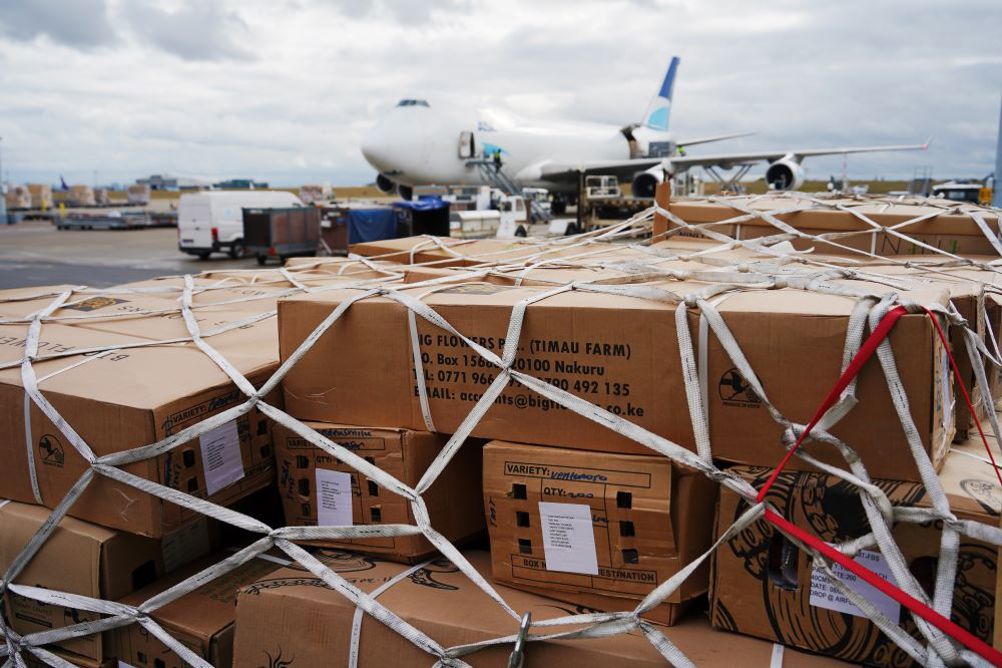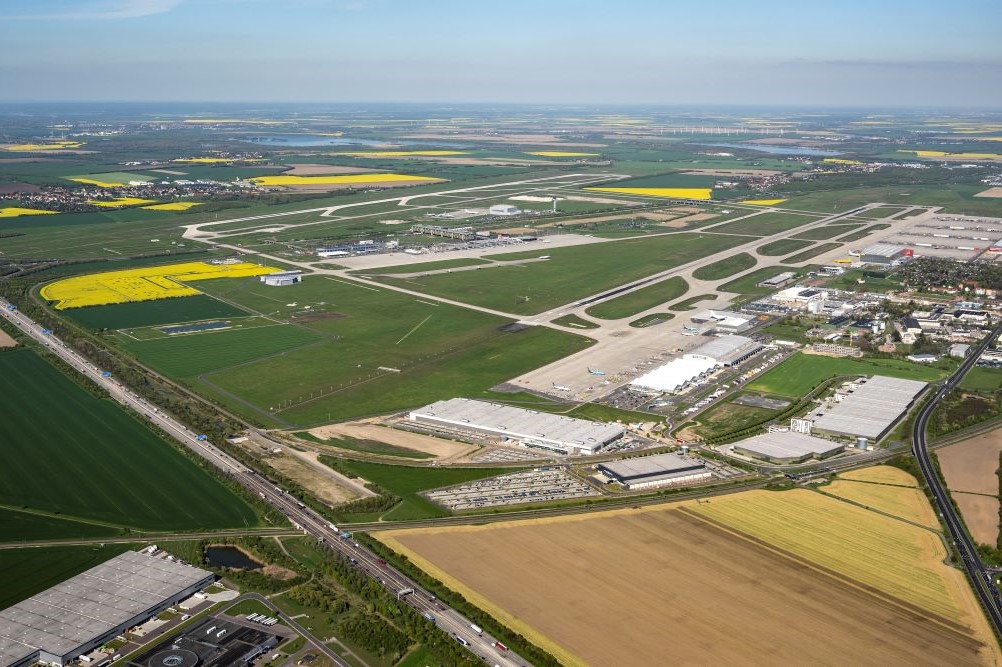
European carriers represent around 21% of cargo tonne kilometres (CTK), according to data from the International Air Transport Association (IATA), and are seeing improved results after two challenging years.
In 2023, they saw demand fall 3.9% with IATA saying Europe was most heavily affected by the war in Ukraine.
Results improved at the end of the year and have been stronger going into this year with IATA data showing double-digit growth in the first four months.
In April, CTK was up 12.7% year-on-year with intra-European CTK up 34.4%, the best result in over a decade. Europe-Middle East routes were up 30.1%.
Major airports in the region have felt the effects of falling volumes with Liege Airport handling 1.05 million tonnes in 2023, a fall of 11.8%.
The airport says the main reasons were FedEx downsizing the former TNT hub operation and the departure of AirBridgeCargo Airlines, which had been a key player at several airports in Europe.
This year, the airport is expecting to handle around 1.14 million tonnes.
Primarily serving freighter aircraft, Liege Airport had a good pandemic with tonnage growing 24% from 2019 to 2020, jumping from 902,480 tonnes to 1.12 million tonnes.
The number jumped again with 26% growth in 2021 to 1.4 million tonnes.
The return of belly capacity as passengers start flying again has impacted Liege, with Torsten Wefers, Vice President Commercial & Sales commenting, “With the return of the passenger flights, some volumes are moving back to the belly capacities but the demand for reliable freighter capacities (via LGG) is higher than in the pre-Covid period.”
To retain its status as an attractive air cargo hub, Liege Airport is investing in warehouse infrastructure, a new ring road around the airport, better access roads to motorways, development of new digital tools and staff resources to manage the community and business.
The airport will continue to make investments with the Vision 2040 master plan.
Through Vision 2040, additional first and second line warehouse capacity will be added for airlines and forwarders, 16 additional parking stands, a widebody MRO hangar, extensions to the secondary runway and additional taxiways will be added.
Wefers says, “The airport is investing in additional digital tools, service levels and the formalising of the cargo community as second driver of the future airport development.”
Liege Airport’s vision is to be the preferred cargo-only airport for Europe and an alternative to traditional cargo hubs.
It is targeting becoming a top-3 cargo hub and to handle 2.3 million tonnes by 2040.
Wefers says, “Next to the development of the existing business and customer portfolio, a strong focus is on the further development of the forwarder footprint and gaining market share from other airports.”
Long-term growth
In 20 years, Leipzig/Halle Airport in Germany has grown at above average rates to become one of the busiest cargo airports in Europe.
In 2006, the airport handled around 30,000 tonnes, which had risen to almost 1.6 million tonnes in 2021 helped by express services.
DHL Express has been operating its largest hub at Leipzig airport since 2008.
Steffen Böttger, Vice President Sales Cargo/Logistics at Leipzig/Halle Airport says companies at the airport handled 1.4 million tonnes in 2023, down 7.7% year-on-year due to the global economic situation and international conflicts.
The 2023 results were more than 12% above figures posted in 2019.
This year has got off to a strong start with 226,000 tonnes in January and February, 2.5% above last year.
Böttger says, “The increase has mainly been due to higher figures for shipments between China and Europe. The number of weekly cargo flights between Leipzig/Halle and destinations in China has doubled to as many as 14 in comparison with the same period in the previous year.”
Charter services are growing with Antonov Airlines basing its AN-124 fleet at the airport following the outbreak of war.
They are providing capacity for the oversized cargo market. AN-124s have been based in Leipzig since 2007 assisting with NATO programmes such as SALIS (Strategic Airlift International Solution).
Growing 22% between 2019 and 2022, Leipzig/Halle Airport is now a top 5 airport in Europe.
Böttger says, “The main reason for the significant growth was the record demand during the pandemic, when the closure of borders adversely affected supply chains. The airport also served as a handling centre for medical goods and protective equipment for Germany and Europe.”
Around 70 cargo airlines use Leipzig airport and the airport handles more than 1,100 cargo flights a week.
The aircraft fly to more than 260 destinations in more than 80 countries.
Leipzig/Halle Airport has spare capacity and room to expand, which provides customers with long-term planning and investment reliability.
Böttger says combining this with multimodal infrastructure and direct access to motorway and railway networks, the airport is ideal for airlines and logistics companies.
Links to trans-European motorways means trucks can reach 15 different countries in eight hours and freight trains travel between German seaports and the airports every day.
Böttger says Leipzig/Halle Airport has been designed as a prime example of a multimodal centre, saying that any aircraft can use the two runways, which measure 3,600 metres as they can be used independently and are not subject to any restrictions.
He says, “We therefore view ourselves as a cargo-minded airport. We are deliberately using this potential to persuade customers about the benefits that exist here at LEJ. Our focus is particularly on the Asian market.”
The airport operator has signed partnerships with airports in Shenzhen, Shanghai and Ezhou, as well as the Airports of Thailand and SF Express.
The airport will continue to grow with hundreds of millions of euros being invested in expanding the apron areas, especially around the DHL hub in the coming years.
Construction work for more logistics facilities will start this year including Weerts Group constructing buildings within the cargo area.
Böttger says, “Several more hundreds of hectares are also available, both land-side and air-side, and they can be developed and opened up.”
He is confident about the future, highlighting GEORGI Handling expanding its logistics space close to the airport and online trader of luxury fashion, Mytheresa, starting operations next to the airport.
Asia is a key market for Mytheresa so benefits from Leipzig’s links to the region.
Böttger says, “The Belgian Weerts Group is constructing a logistics and air freight building, which measures approx. 39,000 square metres, near the airport. Our biggest customer, DHL, is also planning further growth at the site. This all makes us optimistic about the future.”

Open for logistics
The Netherlands has a well-deserved reputation as a good country to do business in and a strong logistics network, which benefits from having two airports with cargo operations, Amsterdam Airport Schiphol and Maastricht Aachen Airport.
Jonas van Stekelenburg, CEO of Maastricht Aachen Airport says 2023 was a successful year with Royal Schiphol Group taking a 40% stake in the airport.
Royal Schiphol Group has invested €30 million, the same as the province of Limburg, which controls the other 60% stake, into the new runway.
Trucked freight volumes were up 270% from 11,120 tonnes to 31,056 tonnes while the runway was being renovated.
Airlines are returning with Royal Jordanian Airlines being welcomed back and the airport is in advanced talks with other airlines about launching services.
Growing sustainably is very important with the airport moving to Airport Carbon Accreditation Level 3 designating Maastricht as Level 3 – Optimisation.
Van Stekelenburg says, “Looking forward, we are currently preparing our application for our new airport licence to increase the length of our operational runway from 2,500 metres to 2,750; this is a huge advantage for cargo airlines that fly longer routes and to fly with more freight.”
Maastricht Aachen has always been a top airport for cargo handling, says van Stekelenburg, and the Netherlands has always been a top logistics hub.
In partnership with local agents and handlers, a new Air Cargo Netherlands branch office has been opened in Maastricht.
He says, “Maastricht is consistently benefiting from the strong links it has forged and the strong relationships it has maintained with airlines, the supply chain industry and local partners who all play a part in the success of the airport and our local cargo community.”
Collaborating with Royal Schiphol Group is helping streamline operations but there needs to be greater collaboration between airports and logistics companies, says van Stekelenburg.
He says streamlining operations through compatible IT solutions and working together to manage logistics and airspace, Dutch airports and logistics companies can lead the world in sustainable logistics and freight.
“Of course, Dutch airports are always willing to collaborate, and of course we know there always exists further avenues for collaboration,” he says.
The Netherlands benefits from having cargo operations in Amsterdam and Maastricht with over 1.4 million tonnes of air cargo being handled in 2023, and they are collaborating more closely to address demand.
Maastricht has no slot restrictions, it has 5th freedom traffic rights and fast cargo handling times.
Van Stekelenburg says the lack of restrictions, the CEIV-certified pharma centre and a reputation for handling perishables makes an attractive hub.
He says, “All of these features mean that Maastricht plays an invaluable role in our country’s logistics operations, and we are glad that the team here are continuing to enhance our country’s reputation for excellence in this field.”
Post-pandemic growth
Operational performance was strong for Menzies Aviation in 2023, continuing the post-pandemic trend with London Heathrow and Budapest airports doing particularly well, says Vice President Cargo Europe, Karl Aldwinckle.
Menzies Aviation won several new contracts at Heathrow including Thai Airways Cargo, Middle East Airlines, Royal Air Maroc, Royal Jordanian Airlines, Scandinavian Cargo and Tarom.
“This series of wins and renewals is indicative of the momentum behind our growing cargo footprint in Europe,” comments Aldwinckle.
The Menzies team are proud extending their partnership with Sichuan Airlines at Budapest Airport.
Starting with one turn a month in June 2022, it grew to three a week in April 2023 then five a week in June.
Aldwinckle says, “This is credit to our local teams who have focused on building and strengthening relationships with our airline partners, providing high-quality cargo services, and ensuring we add value everywhere we operate.”
The signs for 2024 are positive with rising volumes of e-commerce entering the market globally, which is expected to continue beyond this year.
The biggest impact the pandemic had on the sector was on the workforce with a high staff turnover.
Aldwinckle says, “While the rate of staff turnover has reduced dramatically since then, we continue to focus on ensuring that we’re attracting and retaining the next generation of aviation professionals. We know that our people are our greatest asset.”
Digitalisation and sustainability are key areas to strengthen operations today so business can continue growing in the future.
The team are proud of the Menzies Air Cargo Handling (MACH) cargo management system, which will be rolled out to the rest of the network this year.
MACH transforms data accuracy and generates bespoke solutions with its modern user interface, optimised accessibility and the ability to integrate with other systems.
Commenting on sustainability, Aldwinckle says, “We know that making our operations more sustainable isn’t just the right thing for the environment, it’s also the commercially smart thing to do.”
Menzies has partnered with BioNatur Plastics, using its products in the USA. The biodegradable and recyclable material will be rolled out in the UK and Europe soon.
Operating nine cargo locations in Europe, Aldwinckle says the outlook is good, saying, “We look forward to continuing to maintain first-class cargo services at our existing locations and building on new opportunities in Europe.”
This article was published in the June/July 2024 issue of Air Logistics International, click here to read the digital edition and click here to subscribe.
